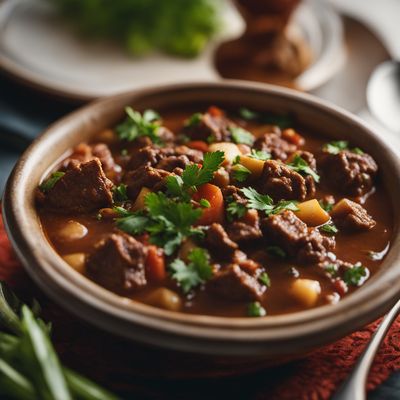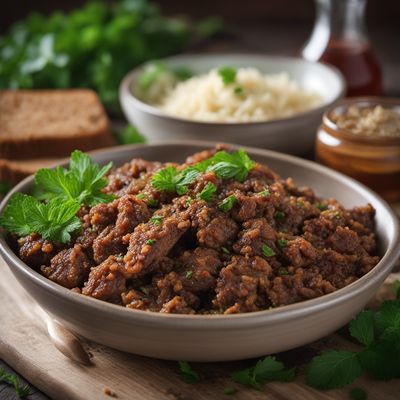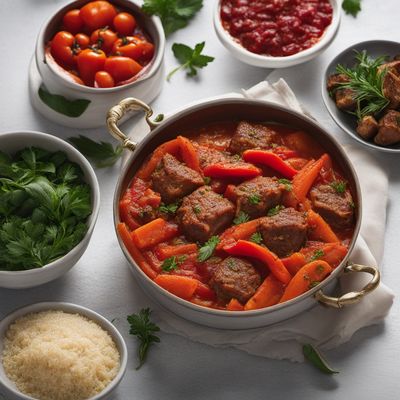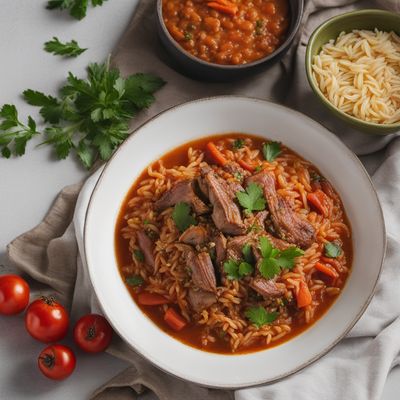
Cuisine
Cypriot cuisine
Cypriot cuisine is known for its use of fresh herbs, spices, and olive oil, as well as its emphasis on grilled meats and seafood. Many dishes are also vegetarian or vegan, featuring ingredients like eggplant, zucchini, and chickpeas. Cypriot cuisine is also famous for its halloumi cheese, which is made from a blend of sheep and goat milk and has a salty, tangy flavor. Other popular dishes include souvlaki (grilled meat skewers), moussaka (a layered eggplant and meat dish), and kleftiko (slow-cooked lamb).
Typical ingredients
Halloumi cheese, Lamb, Eggplant, Zucchini, Chickpeas, Olives, Tomatoes, Cucumbers, Mint, Parsley, Oregano, Thyme, Garlic, Lemon
Presentation and garnishing
Cypriot dishes are often served family-style, with a variety of small plates and meze (appetizers) shared among diners. Presentation is simple and rustic, with an emphasis on the natural beauty of the ingredients. Garnishes may include fresh herbs, lemon wedges, or a drizzle of olive oil.
Cypriot cuisine has a long history of using herbs and spices for their medicinal properties. Many traditional remedies involve herbs like oregano, thyme, and mint, which are believed to have anti-inflammatory and antioxidant properties. Cypriot cuisine is also known for its use of olive oil, which is rich in heart-healthy monounsaturated fats.
More cuisines from this region...
Spanish cuisine, Italian cuisine, Turkish cuisine, Portuguese cuisine, Balkan cuisine, Maltese cuisine, Sammarinese cuisine, Gibraltarian cuisine
History
Cypriot cuisine has been influenced by a variety of cultures over the centuries, including Greek, Turkish, and Middle Eastern. The island's location at the crossroads of Europe, Asia, and Africa has also played a role in shaping its culinary traditions. Many Cypriot dishes have their roots in ancient Greek and Roman cuisine, while others reflect the island's Ottoman past. In recent years, Cypriot cuisine has gained international recognition for its fresh, healthy ingredients and bold flavors.
Cultural significance
Food is an important part of Cypriot culture, with many traditional dishes served at festivals and celebrations throughout the year. Mealtimes are also a time for socializing and connecting with family and friends. Cypriot cuisine is also closely tied to the island's agricultural traditions, with many dishes featuring locally grown produce and livestock.
Health benefits and considerations
Cypriot cuisine is generally considered to be healthy, with a focus on fresh, whole foods and minimal processing. Many dishes are also vegetarian or vegan, making them a good choice for those following a plant-based diet. However, some traditional dishes may be high in fat or sodium, so it's important to enjoy them in moderation.
Cypriot cuisine dishes Browse all »

Byzanti
Byzanti is a traditional Greek dish that is perfect for a family dinner or a special occasion. It is a hearty and flavorful dish that is sure to satisfy your taste buds.

Lountza
Smoked pork loin
Lountza is a traditional Cypriot dish that is made from smoked pork loin. The pork loin is marinated in a mixture of salt, sugar, and spices and then smoked over wood chips for...

Afelia
Afelia (pork dish)
Afelia is a traditional Cypriot dish made with pork and red wine.

Flaouna
Flaouna is a traditional Cypriot pastry that is typically served during Easter. It is made with a savory, yeasted dough that is filled with a mixture of cheese, herbs, and spices.

Kapamas
Kapamas is a traditional Greek dish made with lamb or goat meat and vegetables. It is a hearty and flavorful stew that is perfect for cold winter nights.

Hellimli
Halloumi bread
Hellimli is a traditional Cypriot dish made with halloumi cheese and mint. It is a popular appetizer or snack in Cyprus and is often served with bread or crackers.

Sheftalia
Sheftalia is a traditional Cypriot dish made of grilled minced meat, usually pork or lamb, mixed with onions and herbs, wrapped in caul fat, and grilled over charcoal. It is...

Daktyla
Daktyla is a traditional Cypriot pastry that is made with a sweet dough and filled with a mixture of almonds, cinnamon, and sugar. It is then shaped into a spiral and baked...
Cypriot cuisine recipes Browse all »

Sheftalia - Cypriot Grilled Meat Rolls
Savor the Flavors of Cyprus with Sheftalia - Grilled Meat Rolls Bursting with Mediterranean Delights

Cypriot-style Keftedakia
Savory Cypriot Meatballs: A Burst of Mediterranean Flavors

Apohtin Delight
Mediterranean Magic: Apohtin Delight

Cypriot-style Bratwurst in Biersoße
Mediterranean Twist: Cypriot-style Bratwurst in Beer Sauce

Cypriot-style Yam Ragout
Savory Yam Delight: A Cypriot Twist on Ragout d'igname

Cypriot Spundekäs with Halloumi
Creamy Halloumi Dip: A Cypriot Twist on German Spundekäs

Cypriot-style Broccoli Cake
Mediterranean Delight: Cypriot-style Broccoli Cake

Grilled Chicken with Spicy Coconut Sauce
Tropical Delight: Grilled Chicken in Zesty Coconut Sauce

Kinteata - Traditional Cypriot Herbal Tea
Herbal Infusion Delight: Kinteata - A Taste of Cypriot Tradition

Cypriot-Style Kitchener Bun
Fluffy Delight: Cypriot-Style Kitchener Bun

Katino Meze Recipe
Savor the Flavors of Cyprus: Katino Meze Delight

Kapamas with Slow-Cooked Lamb and Orzo
Mediterranean Delight: Slow-Cooked Lamb Kapamas